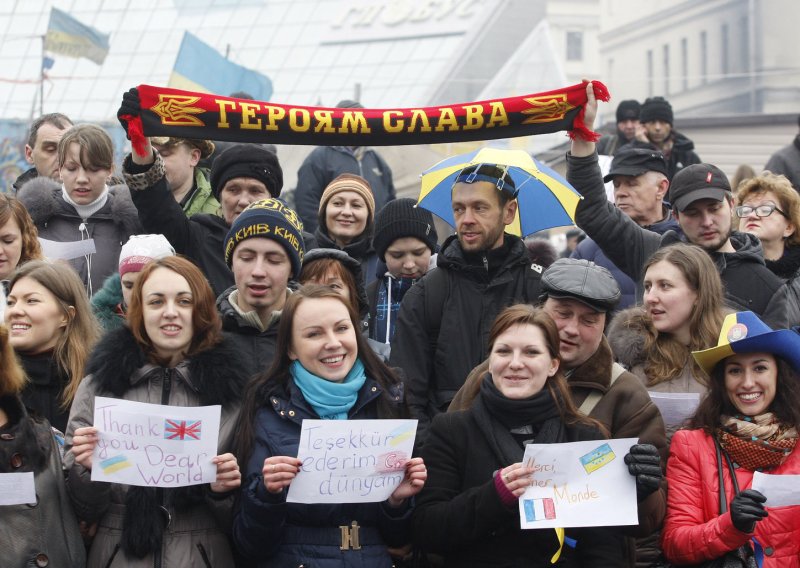People rally in appreciation for the world reaction to Russia actions in Crimea and in Kiev on March 6, 2014. UPI/Ivan Vakolenko |
License Photo
KIEV, Ukraine, March 7 (UPI) -- The Russian parliament voted Friday to endorse Crimea's plan to secede from Ukraine.
The vote in the Duma or lower house of parliament was unanimous, CNN reported. Thousands of people rallied in Moscow in a show of support for Crimea, RIA Novosti reported.
The Crimean Parliament voted Thursday to break away from Ukraine and scheduled a popular vote on the issue for March 16.
In Crimea, gunmen stopped observers from the European Union from crossing into the region, CNN said. Two Ukrainian television channels were also blocked with Russian state television using one of the frequencies. CNN said armed men thought to be Russian used a truck to smash through the gates of a Ukrainian military outpost near Sevastopol that controls air traffic in southern Ukraine.
Gunmen also attacked foreign journalists, including a Bulgarian who was assaulted by men wearing masks. CNN was ordered to stop broadcasting from a hotel in Simferopol, the regional capital.
Legislators from Crimea were in Moscow to meet with their Russian counterparts. Duma Speaker Sergei Naryshkin said Russian lawmakers would strongly endorse the secession move, the New York Times reported.
"We will respect the historic choice of the people of Crimea," Naryshkin said, "Members of Parliament support you in the strongest terms."
The move to secede from Ukraine was denounced by the new government in Kiev, which said it would nullify the decision and dissolve the Crimean Parliament.
In Washington, President Obama also denounced the decision and planned vote Thursday when he announced sanctions in response to Russia's military occupation of the Crimean peninsula.
Hours after he announced the punitive actions, Obama and Russian President Vladimir Putin – who has maintained there are no Russian troops in Crimea, despite evidence to the contrary – spoke about an hour by telephone. The White House said Obama urged Putin to authorize direct talks with Ukraine's new government, allow international monitors to enter the troubled region and withdraw his forces to the bases Russia leases in Crimea.
"President Obama indicated that there is a way to resolve the situation diplomatically, which addresses the interests of Russia, the people of Ukraine, and the international community," the White House readout of the conversation said.
In its version of the conversation, the Kremlin stressed Russia considers the new government in Kiev is illegitimate.
"In the course of the discussion there emerged differences in approaches and assessments of the causes which brought about the current crisis and the resulting state of affairs," the statement said. "Vladimir Putin, for his part, noted that this had occurred as a result of an anti-constitutional coup, which does not have a national mandate."
"Russia cannot ignore [Crimea's] appeals for help in this regard," but that it would act in full compliance with international law, Putin said.
Russian armed forces held the Crimean peninsula, surrounding military bases and border crossings, as diplomats met Thursday to try to end the standoff, the Times said. Adding to the tension was the beginning of new Russian military drills.
In Kiev, Interim President Oleksandr Turchynov said the national government would invalidate the Crimea Parliament's decision to hold the referendum and dissolve Crimea's legislative body, the Times said.
"This will be a farce," he said in a televised address. "This will be false. This will be a crime against the state." He insisted that Ukraine would "protect the sanctity of our territory."
Officials in Kiev already declared the Crimean Parliament was acting illegally, and a court issued an arrest warrant for Sergei Aksyonov, leaders of the breakaway effort, who was installed as Crimea's prime minister last week.
Refat Chubarov, the leader of the main Tatar organization and a lawmaker, and other leaders of the Crimean Tatar minority also denounced the move as "completely illegal."
"More troubling for us is that this decision could provoke and lead to further escalation of tensions," Chubarov told the Times. "A referendum under the conditions of the presence of foreign troops on the streets is called something entirely different in world practice -- it's a coup. It's the seizure of territory."
The European Union suspended talks with Moscow on a broad political-economic pact and on easing visa requirements to make it easier for Russians to travel to Europe, the Times said. European leaders presented a three-stage process that, if no progress were noted, would accelerate to travel bans, asset seizures and cancellation of an EU-Russia summit meeting and eventually to broader economic measures.
The moves came as Secretary of State John Kerry met with Russian Foreign Minister Sergei Lavrov, in Paris on ways to defuse the crisis.















